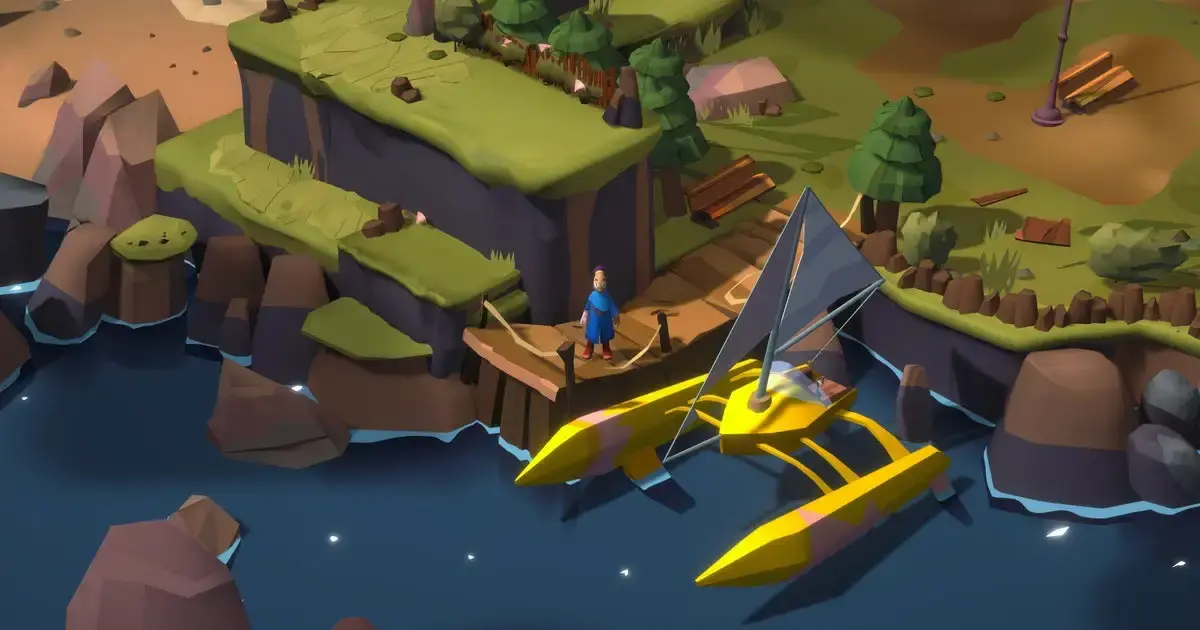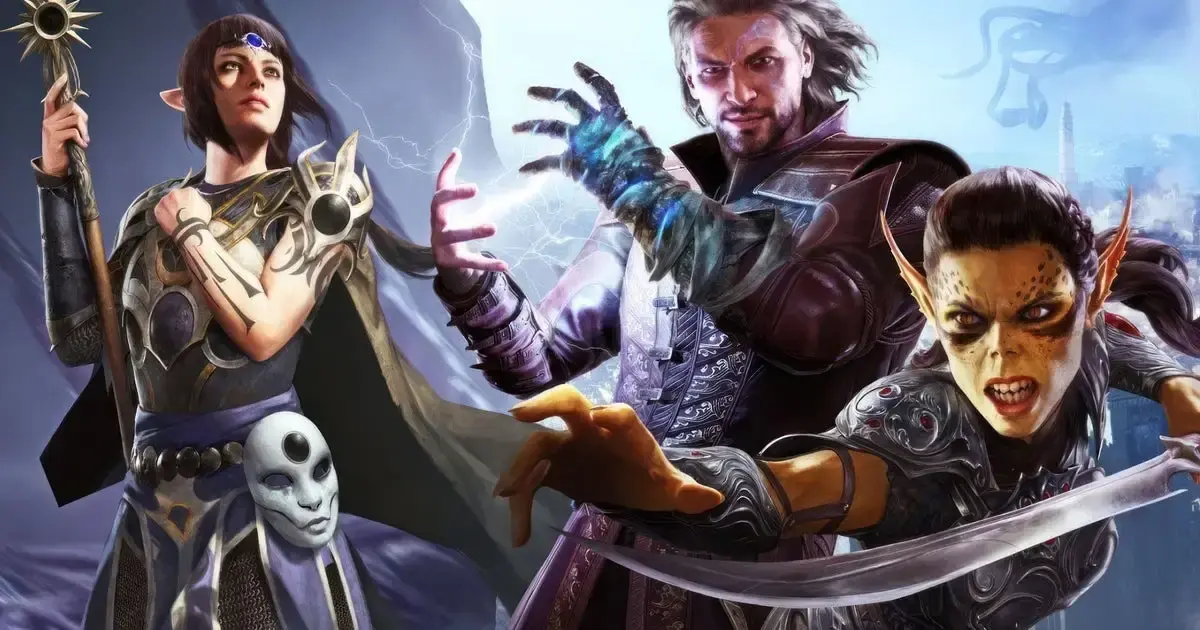- 14 Posts
- 428 Comments
- @DdCno1@beehaw.org to
 English
English - •
- youtu.be
- •
- 2h
- •
Das war knapp ein Jahr bevor ich mich ernsthaft angefangen habe, mit dem Thema zu beschäftigen, aber um dir ein paar Anhaltspunkte zu geben: 10 DM im Jahre 1997 entsprechen 8,39 € heute. Die Preise für die Joysticks, Gamepads und Lenkräder entsprechen grob den Preisen, an die ich mich erinnere (wobei ich selbst als Kind nie ein Gamepad für 15 DM gekauft hätte - das konnte nichts taugen). Gerade Lenkräder waren trotz niedriger Qualität (Force-Feedback war selten und die Verarbeitungsqualität dürftig) generell sehr teuer zu der Zeit. Die Spiele sind fast alle zwei Jahre alt (Pearl war und ist eine Resterampe) und entsprechend etwas reduziert im Vergleich zum Neupreis. Wenn ich mich recht erinnere, fing die Software-Pyramide erst im Jahr darauf an, den Preis von älteren PC-Spielen deutlich nach unten zu treiben, entsprechend können das durchaus normale Preise sein.
Das VR-Headset war zu dem Zeitpunkt ebenfalls zwei Jahre auf dem Markt, ziemlich lausig (263x230 pro Auge waren selbst 1995 nicht der Brüller), die Firma dahinter bankrott und das Gerät entsprechend stark reduziert, aber immer noch kostspielig. Es gab freilich keine Alternative für Heimnutzer. Ich konnte keine Preise von anderen Händlern aus dem Jahr finden, entsprechend kann ich dir nicht sagen, ob das ein gutes Angebot war. Der Rabatt ist aber echt.
Zum Vergleich ein kleiner Exkurs: Ein Budget-PC kostete in dem Jahr (ohne Bildschirm) um die 2000 DM - und mit einem lausigen kleinen 14 oder 15 Zoll CRT, dem man nicht mehr als 800x600 Pixel zumuten sollte, gerne noch mal 500 DM mehr. Der Durschschnittspreis für einen PC mit Internetzugang lag in dem Jahr bei 4621 DM. Die hohen Preise sind ein Grund dafür, warum selbst 1998 nur 38,7% der Haushalte in Deutschland über einen Computer verfügten.
Außerdem war anders als heute die teure Hardware sehr schnell veraltet: Der schnellste Prozessor im Jahre 1997 lief mit 500MHz, aber nur zwei Jahre später wurde die Gigahertz-Grenze durchbrochen - und Software, gerade Spiele, neigte viel eher als heute dazu, relativ neue Hardware vorauszusetzen. Schönes Beispiel: Dieser High-end PC von 1997 für 6666 DM hat einen 500 MHz Prozessor, 64 MB RAM und eine 4 GB Festplatte. Wir haben 2001 unseren ersten PC gekauft, für ca. 1800 DM: 1,3 GHz, 128 MB RAM, eine richtige (wenn auch lausige) Grafikkarte in Form einer Geforce 2MX und 10x so viel Festplattenspeicher.
Was ich damit sagen will: OK-Preise für Technik im Jahre 1997 waren immer noch viel Moos.
Sooo, since I have you as an enthusiast here: The only Silent Hill I’ve ever played was Shattered Memories way back when (I actually have a rare pre-release press copy). Clever game and equally scary. Which game should I pick up first if I wanted to seriously get into this series? This new remake of Silent Hill 2? The original Silent Hill? Shattered Memories again?
Ahh… Pearl. Home of every kind of future landfill fodder disguised as tech (and even some legitimate products), dubious feature lists and even more dubious included bonuses for almost 30 years. At least the cover girls aren’t dressed like discount Playmates anymore.
I like how on this page they aren’t specifying the “car racing game” and “full version of well known flight simulator” packed in with the “Multi-Gamestation^Plus”. I think I can hear the creaking of this thing’s cheap, hard plastic through space and time. It seems like the VR headset and 3D glasses weren’t shipping enough units, given that this is at least the second time they discounted them:
https://archive.org/details/pearl-basis-katalog-weihnachten-1996-1997/page/n9/mode/2up
But they made up for it by driving up the price of the “Multi-Gamestation^Plus” a little.

The difference is intent: It is perfectly fine to have an HQ in a city that is clearly marked as such. Israel placed their intelligence headquarters in the center of Tel Aviv just like any other government building, similar to how for example the MI6 building is in central London, the BND is in central Berlin, DGSE in central Paris, etc. It makes sense to have buildings belonging to a vital government agency within short distance of other government buildings in the capital, for very obvious reasons. I doubt anyone has ever accused MI6 of using the citizens of London as human shields.
What Hamas and Hezbollah are doing however is placing their infrastructure and even weapons platforms directly next to, on top of, underneath and in civilian structures like housing, schools, hospitals, etc., precisely so that there are only bad options for Israel: Either they don’t strike and have to then live with being shot at or otherwise harmed by these structures - or they do attack them as is permitted by the Geneva Convention (any civilian structure used for military purposes loses most of its protection), but get roasted by a part of the Western public for doing so.
Here’s an excellent study on this topic, in case anyone wants to learn more:
https://stratcomcoe.org/publications/hybrid-threats-hamas-use-of-human-shields-in-gaza/87
It’s from a livestream and then saw at least another additional generation of compression when IGN reuploaded it again. This upload from Epic themselves is ever so slightly sharper and less desaturated (if my eyes are not deceiving me), but it’s still only 1080p:
The difference isn’t that great, but texture and object detail aren’t what this particular demo is about, so it doesn’t really matter all that much.
- @DdCno1@beehaw.org to
 English
English - •
- www.pcgamer.com
- •
- 2d
- •

It is undeniably satisfying though to turn all settings in a game up to maximum without performance tanking, but you and I (same card, but 1440p screen) are not the target audience. This is for people who want (and can afford) at least 4K with ray-tracing in the latest games and all of this at triple-digit frame rates - or they are actually using it for non-gaming applications: Even our old 2080 is a beast for tasks like offline rendering, scientific calculations, machine learning, etc. - and a 4090 is of course several times better at this.
I know this is going way off-topic, but I love providing a bit of perspective: The fastest supercomputer in 1996 was the Hitachi CP-PACS/2048 at 368.20 GFLOPS. In 1997, it was the Intel ASCI Red/9152 at 1.338 TFLOPS. An RTX 2080 achieves 314.6 GFLOPS at 64-bit precision (as used by the TOP 500 list of supercomputers) and an RTX 4090 1.290 TFLOPS. Granted, despite similar processing power on paper (and FLOPS being hardly an objective measure to compare vastly different architectures and systems), even ancient supercomputers still have modern GPUs beat in terms of the amount of memory alone (although latency is of course far worse): 128 GB (2,048 * 64 GB MB) in case of the Hitachi system, for example.

In a two-party system, you’re throwing away your vote that could get Harris instead of Trump elected for not even a blip on the radar. This is at best pointless grandstanding.
Edit: Decided to read a little into her. She’s nothing but a spoiler candidate, meant to syphon voters away from Harris, just like Stein. Cherry on top: Apologia for China and North Korea and funding from China, which alone should motivate any decent human being to avoid her like the plague: https://en.wikipedia.org/wiki/Claudia_De_la_Cruz_2024_presidential_campaign#Criticism

This is so strange to hear. I loved Frostpunk, but found it to be the very opposite: Far too easy and forgiving, which made the finale in particular, as the music swells up dramatically and the storm reaches its peak, feel kind of anticlimactic, because everyone was well-fed and warm(ish) in my settlement on my first attempt of playing it. Not one person froze or starved to death, no kids were sent into the mines and we most certainly didn’t serve a 19th century spin on Soylent Green.
I know this sounds like I’m bragging, but I think the reason why this game felt so trivially easy to me is that I grew up with far more complex, challenging and punishing city builders, like Caesar 3, Pharaoh, The Settlers 2, 3 and 4, Anno 1602 and 1503, etc. I must have played many hundreds of hours of Caesar 3 alone, watching city after city succumb to fires, pestilence, barbarians and unrest until I figured out how to deal with these issues. There are so many more variables and difficult decisions in these games compared to Frostpunk, despite their idyllic presentation. Frostpunk’s core city building mechanics suffer from the very idea the narrative and the few scripted decisions aim to avoid: Pretty much every problem the player has to face when building the city has an ideal and obvious solution (if you know your city builders). It’s more of a puzzle game than an actual city builder. A very pretty and atmospheric one, which is why I enjoyed the brief campaign, but still.
I hope this encourages you to pick it up again. It may seem difficult at first glance, but once you figure it out, you can cruise your way through it with little effort and spend most of your time looking at the pretty graphics, waiting for the next scripted event.

… until you inevitably need to use the shell. Linux, no matter the flavor, has been very easy to use in the 22 years that I’ve tried to use it - until you need to dig ever so slightly deeper for something and then it very much isn’t. I started out with a Knoppix live-CD back in 2002. Remember that distro?
- @DdCno1@beehaw.org to
 English
English - •
- www.pcgamer.com
- •
- 8d
- •

You might perceive this as annoying, but can’t you see that I’m trying to get something more out of you, that I’m trying to encourage you to be at least a tiny bit intellectually curious, to think about this just a little bit? Hell, I would be ecstatic to sense anything resembling uncertainty from you. I might not always be showing it, but I am always second-guessing myself, am never even remotely certain about how I’m seeing the world. I am engaging in these discussions, because I want to both challenge and be challenged, but I’ve been mostly disappointed. There’s nothing I crave more than a good discourse, a proper exchange of words and ideas. Civil, but not to the point that genuinely valuable opinions are being held back.
As a last attempt to get anything resembling a proper opinion based on your own thoughts instead of that of others out of you: Can you name any other occupation similar to this alleged one? Have you ever thought about finding comparable occupations? I’ve tried finding one that comes close or is even remotely similar, but haven’t been able to.
The often cited South African Apartheid really doesn’t compare, because there are Palestinian citizens living in Israel with, at least on paper, full rights (and minus one obligation - they don’t have to serve in the IDF, but can voluntarily sign up, which a couple thousand are doing every year, more so after October 7th). There’s even a Palestinian supreme court justice. If there was actual Apartheid, then this wouldn’t be the case. In practice, Israeli Arabs are similarly discriminated against as people of color in countries like the US, but nothing in Israel comes close to what South Africa did to its Black citizens or what Jim Crow laws did in America. Feel free to pick this opinion of mine apart though (but please, with your own words for once - if I wanted to read Wikipedia articles, I would do this myself).
You can at least clearly see the difference between Gaza and the West Bank, right? In the West Bank, there’s an agreement with the ruling Fatah for Israel to assist in security matters, although in reality, the relationship is more that of a vassal proto-state that is too weak to both secure its own territory without being overthrown and meaningfully resist Israeli military supremacy after having lost against it multiple times in the past. Israeli soldiers and police officers are routinely carrying out raids against terrorists together with members of Fatah security forces. They are also setting up road blocks, impairing the movement of the Palestinians living there not just at the borders to Israel, but within the territory as well (seemingly randomly and often to a paralyzing degree - I’ve read reports of pregnant Palestinian women failing to get to hospitals in time, for example), etc. There are settlers in parts of the West Bank trying to expand their territory, often using violence and with help or at least tolerated by the IDF and Israeli police (and they are further emboldened since the start of the war). This is more or less (save for some contradictory peculiarities, like the Fatah’s controversial martyr’s fund) what a “normal” occupation looks like and has always looked like even going as far back as antiquity, down to getting rulers from the local population to do some of the dirty work for you. None of this applied to Gaza before this war - but I wouldn’t be surprised if that’s how Gaza might be governed and ruled after the defeat of Hamas, except with a likely even stricter security regime.
Meanwhile, another territory actually occupied by Israel, the Golan Heights, is effectively administered like any other part of Israel’s internationally recognized territory, with all Israeli laws applying to it since 1981. Locals there, including non-Jews like the Druze, are citizens of Israel, very much unlike Palestinians living in the West Bank and Gaza. This is the kind of occupation that is labelled as such according to international law, because most nations outside of Israel don’t recognize it as actual Israeli territory. Israel annexed it for purely strategic reasons from Syria (making it arguably a cause separate from the Palestinian one), since otherwise, its heartland would be extremely vulnerable to artillery and other attacks from this area. It’s one of those cases where one can simultaneously acknowledge the clearly illegal nature of this occupation/annexation, while at the same time admitting that this tiny nation with extremely disadvantageous borders and lots of hostile neighbors can’t really afford not to hold onto this small piece of extremely strategically valuable mountainous terrain. It’s definitely a “damned if you do, damned if you don’t” kind of situation, far from the only one Israel has faced and is facing. Once again though, this is completely different from Gaza.
Maybe I overlooked something totally obvious (wouldn’t be the first time), so I invite you to try and find a state acting similar to how Israel did towards Gaza and this being labeled as occupation. Alternatively, you can just ignore this lengthy diatribe and we go our separate ways without continuing this conversation. It’s entirely up to you.

Notice how this particular sentence is not sourced and how there is an entire section in the article further down explaining just how controversial it is to call the area occupied.
Can you explain to me, in your own words, how not having any boots on the ground amounts to occupation under international law? If you’re trying to make the case that the border controls and wall were occupation, then I would like to preemptively remind you that 1) border controls are not occupation, but the right of any sovereign nation and 2) those were a direct reaction to a series of terrorist attacks, including stabbings, shootings and suicide bombings, as well as numerous rocket attacks. Nobody would deny a nation the right to enact measures that prohibit those from occurring on their soil against their citizens. If anything, October 7th showed that this often criticized wall wasn’t even remotely sufficient to counter the threat terrorists from the strip posed against Israel.

Israel forcefully removed all of their settlers from Gaza in 2005. They essentially ethnically cleansed themselves. There were no IDF soldiers on Gazan soil and the administration of the strip was entirely in the hands of Hamas from that point onward. Under no definition of the word occupation was the strip occupied after 2005.

I wonder how many of them would complain in the manner this infamous Republican did a few years ago: https://www.vox.com/policy-and-politics/2019/1/8/18173678/trump-shutdown-voter-florida

“If you want to test a man’s character, give him power.” - (not) Abraham Lincoln
Pretentious quote out of the way, I’m both disappointed and not disappointed. Exactly the answer I was expecting from you, especially this:
but i’m being generous […] please do not make me regret
I know, it’s a serious and in many ways sad topic, but there is some unintentional humor to be found in a queen of her little domain playing the merciful ruler, because otherwise, the comparison I made between you and Cornell’s leadership would have become impossible to ignore. If you’re feeling that announced regret while reading this tame banter, then I apologize - but I would loved to have seen you in some of the larger forums I’ve moderated in the past - and they weren’t even about politics. The users there would have eaten you alive on the first day.
The sad thing is, our opinions on the West Bank aren’t even that far apart (relative to each of our views on Gaza and Lebanon at least). We could have talked about this like human beings, but I get the distinct feeling that you’re more interested in uncompromising grandstanding and cleaning your little domain of anyone who isn’t covering their face with a keffiyeh than anything resembling nuance or civilized discourse. It’s either 100% your way or no way, which is a problem I’ve noticed with many self-proclaimed pro-Palestinians and much of the movement as a whole. The funny thing is that this isn’t even close the main reason why this movement is so ineffective. No amount of conviction and catchy slogans, no campus protests and sit-ins can overcome the maddening complexity of a conflict that has been stumping minds far smarter than that of anyone on this forum for many decades.

I know you don’t like me and my opinions on this topic, but here’s the thing: I support this student’s right to express his opinion, despite the fact that I disagree with him. In an ideal world, he should be able to freely exercise his freedom of speech whenever and wherever he so chooses, but this world clearly isn’t close to ideal. Once again, I’m not supporting what the university his trying to do to him, I’m merely stating that he’s not smart about his activism, because like many other idealists, he fails to realize that he can only make this world the way he wants to a relatively limited degree at once. I don’t think he’s picking his battles all that wisely.
especially for unambiguously morally correct causes
Here’s where we disagree, but you are a moderator who unironically likes to do what this university is doing without even a hint of self-awareness, by temporarily banning me from one of your other communities, because I was a bit too disruptive for your taste on this highly political and contentious topic, one that very much isn’t as unambiguous as you’re trying to portray it as or have been led to believe through your little filter bubble (at least according to my little filter bubble - opinions, opinions, opinions). Like I said in my annoying message to you, I’m just as guest here though, just like this student is at Cornell, so we are both at the mercy of those in charge. The main difference is that my career doesn’t depend on you, of course. The other is that the appeal process here is even worse than Cornell’s… ;)

Much better article: https://www.rollingstone.com/culture/culture-features/cornell-protest-palestine-immigration-1235112444/
Seems like his heart is in the right place, but his brain isn’t.
In other words (and please excuse my French): Don’t shit where you eat. Given his past history as an activist on campus and the reprimands he has received for this, it was extremely risky of him to attend this kind of highly disruptive protest. In the end, he’s merely a guest, at both the university and in the US. It would have been much wiser of him to support his cause elsewhere instead of at and against the institution that he relies on for his degree and visa.
The fact that he’s relatively well-known locally as an activist might actually harm his prospects: While he can briefly leverage this to mobilize his supporters (which appear to be mainly students and relatively few sympathetic academics, which isn’t ideal), this will only further antagonize the administration that seems to be hell-bent on getting rid of a trouble-maker, while at the same time discouraging others, no matter their cause, to protest in the same manner or perhaps even violently, like at other self-proclaimed pro-Palestinian protests at American universities. From a purely Machiavellian perspective - and I do not support this, despite the fact that I disagree with the student, his methods and his cause - Cornell would likely gain more from muffling him and by extension others than by allowing him to continue for at least two more years.
Even if he somehow manages to survive this, it would likely only be temporary: Given his past and present behavior, he would feel emboldened, which in turn would result in him doing something similar or worse again soon, which in turn would finally exhaust any remaining goodwill he’s enjoying with the administration.

In order for Sony to sell the game again and a PS5 (or PS5 Pro) to you - or at least, in a couple of years, the remaster to those who bought the original PC port. There are still about twice as many PS4 than PS5 consoles due to a lack of both exclusives and actual reasons to switch over to the newer system. It doesn’t help that more and more people are realizing that one should replace any mention of “the economy” in the media with “rich people’s yacht money”, given how little average people are benefiting from it anymore, which means disposable income is down. The PS4, despite being almost 11 years old now and still relying on a mechanical HDD (unless you upgrade it), is simply “good enough” in the eyes of many. Microsoft has the same issue, of course, except from a much weaker position in the market. The law of diminishing returns makes newer consoles a hard sell.
At the same time, PC gaming is highly accessible, PC hardware is lasting longer for gaming than ever before (in large part due to the longevity of the previous console generation keeping hardware requirements of most multiplatform games in check) and now that former exclusives are finding their way over at a reliable pace, there are fewer reasons for those that are primarily playing on PC to get a console just for the exclusives. As fantastic as Astrobot looks and as much as I appreciate the return of the classic 3D platformer with physics and shiny new graphics, it won’t make me purchase a PS5 any time soon or ever.
Sony is still producing both PS4 and PS4 Pro (whereas Microsoft discontinued both Xbox One consoles four years ago; they are still supporting the previous gen though), games are still being developed for them, despite first party studios having switched over to PS5 by now. Third party developers who were once happy about the low number of hardware variations they had to deal with now have to handle up to nine different systems if they want to release a game on all currently supported games consoles (ten when Switch 2 comes out) - plus PC and Steam Deck, which might just as well be another console as far as developers are concerned. Correct me if I’m wrong, but I don’t think I’ve ever seen cross-gen games that aren’t just yearly sports titles being made for this long into a new generation at such a large scale. We certainly haven’t had such a wide variety of systems since the early home computer era, even if their architectures and capabilities are much more similar now than they were back then.

I wouldn’t call €1300 (cheapest 8K TV where I’m living) outrageously expensive. You can easily spend this much on a 4K TV without straying into true high-end territory.
I remember when the first “mass market” flat screen TVs came about around in the late '90s. The earliest one I saw with my own eyes was still years away from HD, hardly even flat by modern standards (I think it was a plasma TV), but cost a cool 20 grand. The store had it behind a small fence so that people wouldn’t accidentally damage it. I was not impressed by the image quality and it was actually smaller than the largest CRT TVs I had seen. Maybe 30" at best.
Either way, even with a handful of games now supporting real or upscaled 8K, the issue of a lack of content remains. Streaming services rarely support it beyond the odd demo video on YouTube and even if they did, they are hardly what you go for if you want good image quality, given how mercilessly they compress their content to save on bandwidth costs. There’s no 8K Blu-Ray yet and there might not ever be one. By the time there is a decent amount of 8K content available, the current lineup of 8K TVs will be hopelessly outdated and likely not even support future standards.
Really the most useful application for these I can think of right now is showing photos in all of their glory to bored relatives and friends. 8K is slightly more than 33 megapixels, after all, whereas 4K is just over 8 megapixels. Landscape photography in particular benefits a lot from being seen at higher resolutions.

I had a hunch it would be Nerdcubed. This is almost as good as his birdplane moment: https://youtu.be/QR0DzGS8Q2c?t=539

I think you should look into what Hezbollah actually says instead of naively (or deliberately) creating a false equivalency. Here’s what they teach schoolchildren:
- @DdCno1@beehaw.org to
 English
English - •
- www.thespiritengine.com
- •
- 10M
- •
- @DdCno1@beehaw.org to
 English
English - •
- www.eurogamer.net
- •
- 10M
- •
- @DdCno1@beehaw.org to
 English
English - •
- 10M
- •










Thank you for the thorough answer!